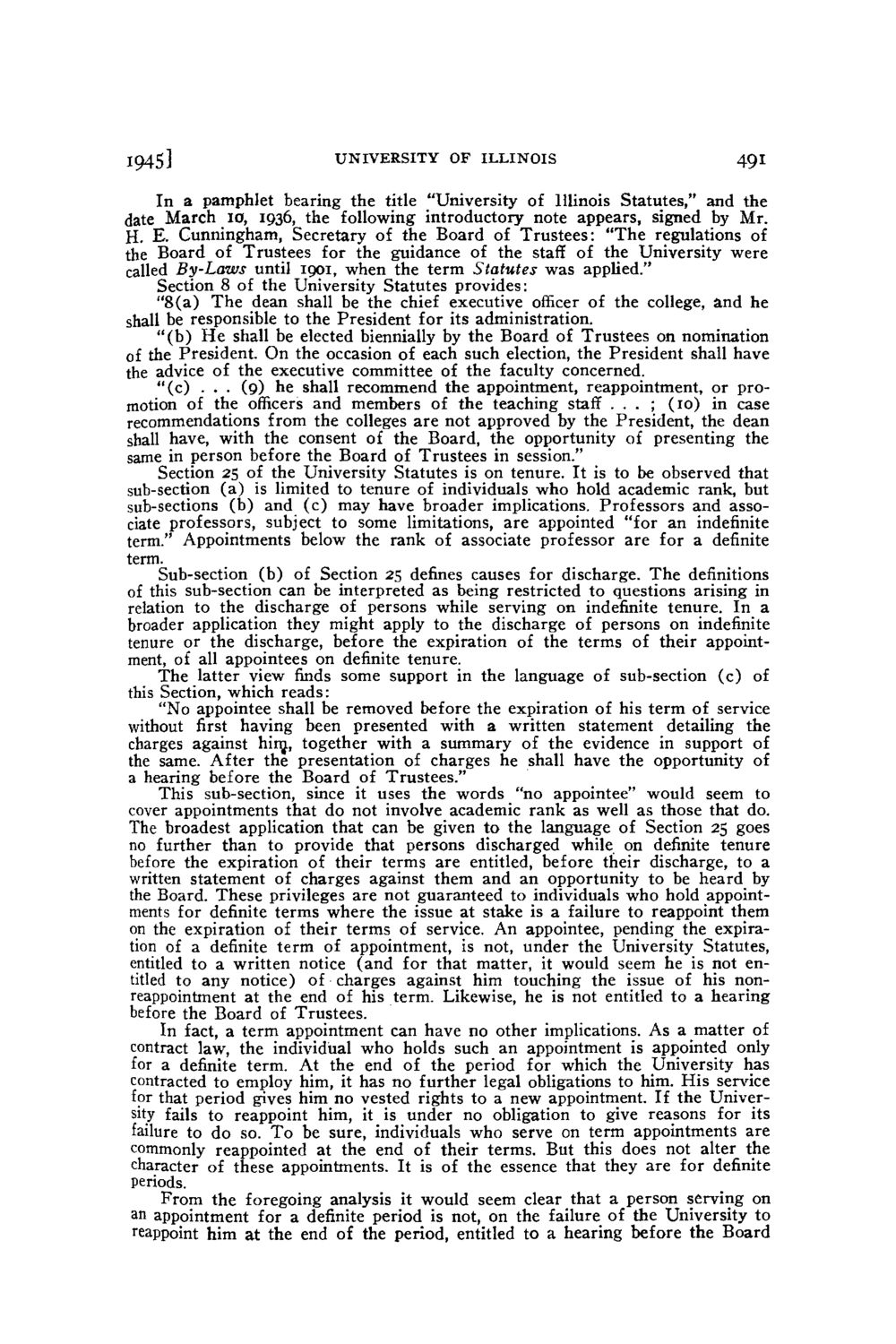| |
| |
Caption: Board of Trustees Minutes - 1946
This is a reduced-resolution page image for fast online browsing.

EXTRACTED TEXT FROM PAGE:
1945] UNIVERSITY OF ILLINOIS 491 In a pamphlet bearing the title "University of Illinois Statutes," and the date March 10, 1936, the following introductory note appears, signed by Mr. H. E. Cunningham, Secretary of the Board of Trustees: " T h e regulations of the Board of Trustees for the guidance of the staff of the University were called By-Laws until 1901, when the term Statutes was applied." Section 8 of the University Statutes provides: " 8 ( a ) T h e dean shall be the chief executive officer of the college, and he shall be responsible to the President for its administration. " ( b ) H e shall be elected biennially by the Board of Trustees on nomination of the President. On the occasion of each such election, the President shall have the advice of the executive committee of the faculty concerned. " ( c ) . . . (9) he shall recommend the appointment, reappointment, or promotion of the officers and members of the teaching staff . . . ; (10) in case recommendations from the colleges are not approved by the President, the dean shall have, with the consent of the Board, the opportunity of presenting the same in person before the Board of Trustees in session." Section 25 of the University Statutes is on tenure. It is to be observed that sub-section (a) is limited to tenure of individuals who hold academic rank, but sub-sections (b) and (c) may have broader implications. Professors and associate professors, subject to some limitations, are appointed "for an indefinite term." Appointments below the rank of associate professor are for a definite term. Sub-section (b) of Section 25 defines causes for discharge. T h e definitions of this sub-section can be interpreted as being restricted to questions arising in relation to the discharge of persons while serving on indefinite tenure. In a broader application they might apply to the discharge of persons on indefinite tenure or the discharge, before the expiration of the terms of their appointment, of all appointees on definite tenure. The latter view finds some support in the language of sub-section (c) of this Section, which reads: "No appointee shall be removed before the expiration of his term of service without first having been presented with a written statement detailing the charges against hirn, together with a summary of the evidence in support of the same. After the presentation of charges he shall have the opportunity of a hearing before the Board of Trustees." This sub-section, since it uses the words "no appointee" would seem to cover appointments that do not involve academic rank as well as those that do. The broadest application that can be given t o the language of Section 25 goes no further than to provide that persons discharged while on definite tenure before the expiration of their terms are entitled, before their discharge, to a written statement of charges against them and an opportunity to be heard by the Board. These privileges are not guaranteed to individuals who hold appointments for definite terms where the issue at stake is a failure to reappoint them on the expiration of their terms of service. An appointee, pending the expiration of a definite term of appointment, is not, under the University Statutes, entitled to a written notice (and for that matter, it would seem he is not entitled to any notice) of charges against him touching the issue of his nonreappointment at the end of his term. Likewise, he is not entitled to a hearing before the Board of Trustees. In fact, a term appointment can have no other implications. As a matter of contract law, the individual who holds such an appointment is appointed only for a definite term. At the end of the period for which the University has contracted to employ him, it has no further legal obligations to him. His service for that period gives him no vested rights to a new appointment. If the University fails to reappoint him, it is under no obligation to give reasons for its failure to do so. T o be sure, individuals who serve on term appointments are commonly reappointed at the end of their terms. But this does not alter the character of these appointments. It is of the essence that they are for definite periods. From the foregoing analysis it would seem clear that a person serving on an appointment for a definite period is not, on the failure of the University to reappoint him at the end of the period, entitled to a hearing before the Board
| |